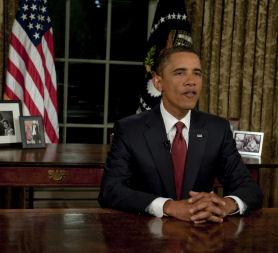Obama: ‘time to turn page’ on Iraq as troops leave
As the last fighting forces leave Iraq, US soldiers have been proclaiming they “have won the war”. President Barack Obama didn’t dare make such bold claims in his address from the Oval Office.

US soldiers have been appearing on American TV announcing “victory”, and claiming that they have brought democracy to Iraq.
But for President Barack Obama, the most notable thing he had to say about the end of US combat operations in Iraq was: “It is time to turn the page”.
He did not call it a victory. He could not say “mission accomplished” because everyone remembers what a disaster it was when President Bush tried to pre-emptively claim that America’s job was done in Iraq. In fact Barack Obama struggled to find anything positive to say about Operation Iraqi Freedom – except that it was over.
“Through this remarkable chapter in the history of the United States and Iraq, we have met our responsibility. Now, it’s time to turn the page,” he said.
Obama went to great lengths to praise the US combat force that have served in Iraq, and to honour the 4,400 American troops who have died there. But he could not pretend he agreed with the invasion of Iraq. Nor did he try to.
Rough waters and soldier tribute
He did say he has talked on the phone with former president George W Bush but didn’t describe the conversation beyond saying its well known that they disagreed about the war.
Obama told the nation: “From this desk, seven and a half years ago, President Bush announced the beginning of military operations in Iraq. Much has changed since that night. A war to disarm a state became a fight against an insurgency. Terrorism and sectarian warfare threatened to tear Iraq apart. Thousands of Americans gave their lives; tens of thousands have been wounded. Our relations abroad were strained. Our unity at home was tested.
“These are the rough waters encountered during the course of one of America’s longest wars. Yet there has been one constant amidst these shifting tides. At every turn, America’s men and women in uniform have served with courage and resolve. As Commander-in-Chief, I am incredibly proud of their service. And like all Americans, I’m awed by their sacrifice, and by the sacrifices of their families.”
As soon as he had finished, pundits on the 24-hour news channels started dissecting his performance. Lacklustre, was one of the first criticisms from people who want to know where all the passion and pizzazz of Obama’s campaign appearances has gone, now he is in the Oval Office. This was a sober-sided, dry and academic performance that is unlikely to have stirred the hearts of many watching voters.
The message on Iraq is a complicated one. After all, US forces are pulling out of country that has not managed to form a government several months after their last election. So it is hard to claim that democracy now reigns supreme.
And a vicious series of coordinated terrorist attacks across the country last week proved there is not really peace and security either. And there are still 50,000 American troops with their boots on the ground just in case things turn really nasty. But they are now just “troops” not “combat troops”.
Afghanistan
And it did not get much easier as the president turned to the ongoing war in Afghanistan. He insisted that the fight was necessary to “disrupt, dismantle and defeat al-Qaida, while preventing Afghanistan from again serving as a base for terrorists.”
He also claimed: “Because of our drawdown in Iraq, we are now able to apply the resources necessary to go on the offence.”
But he made it clear he does intend to pull US combat forces out of Afghanistan just as he has done in Iraq.
“Next August, we will begin a transition to Afghan responsibility,” he said.
“The pace of our troop reductions will be determined by conditions on the ground, and our support for Afghanistan will endure. But make no mistake: this transition will begin – because open-ended war serves neither our interests nor the Afghan people’s.”
The wars in Iraq and Afghanistan are two of the longest fights the US has ever engaged in. They have taken up huge amounts of this president’s time and attention. But they are not uppermost in voters’ minds anymore. This country has become too accustomed to the daily news of attacks, casualties and American combat deaths for it to dominate the political agenda.
What people really care about is the stagnant economy and what the president intends to do to try to reduce the unemployment rate. So Obama found a not too subtle way to blame many of the country’s current economic woes on the last president and his decision to invade Iraq.
What he was saying to the American people was – unfortunately, over the last decade, we have not done what was necessary to shore up the foundations of our own prosperity. We spent a trillion dollars at war, often financed by borrowing from overseas. This, in turn, has short-changed investments in our own people, and contributed to record deficits.
But the White House isn’t going to find a major peace dividend by coming out of Iraq. The withdrawal of combat forces does not mean the president can now start writing cheques for new clean energy initiatives, pay for job creation programmes or even start to tackle the huge deficit.
But it is on the economy that voters are going to judge him. Not on progress toward democracy in Iraq or even on significant military progress in Afghanistan.